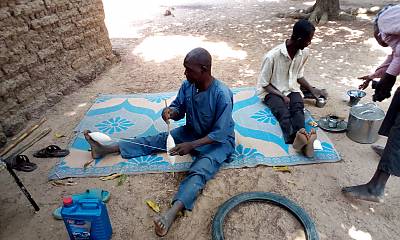PRESENT DAY MALI AND THE CORONA VIRUS STRIKE 19
Brief overview on the Contextual Protecting Measures against Corona Virus 19 Strike
In Mali most people have yet to be able to read and write among grassroots communities, except in the towns of Djenne and Timbuktu. Moreover, while ignorance and addicted religious orientation makes it harder to challenge controversial and fanatic behavioral interpretations of any social phenomenon; awareness raising campaign relating to the Corona Virus 19 Strike becomes even more challenging.
People believe that Corona Virus 19 Strike speaks to pandemic virus manipulation under the politico-administrative control of the powers that be that are ruling the world. Moreover, as a matter of fact, during the early stages of the Corona Virus Strike in and across the world, most people were skeptic about the reality of the pandemic strike worldwide. In Mali, most people are either confused and or still skeptic albeit the collective immunity concerns and protection measures that the Mali Government enacts. Therefore, furthering cost effective dissemination of crucial information on the Corona Virus Strike will sustainably speak to case sensitive cultural approaches in and across grassroots communities as culture is the key tool to sustainable societal change and social cohesion.
Clearly speaking, communities’ containment subsequent to the emergency situation caused the postponement of all community and public annual celebrations and gatherings as well in Mali during the early stages of the pandemic strike, 2019-2020.
Therefore, when social agencies are confined social change and social cohesion are jeopardized, under threat. The Corona Virus Strike coupled with the security crisis in Mali makes life unfashionable for the most vulnerable components of the Malian rural communities. The situation caused a socioeconomic lethargy, which led to a greater malaise in and across Mali. Life looks almost slumbered; albeit Government, social agencies, formal and informal structures and opinion leaders are rallying jointly, using creative responses to roll back the side-effects of the pandemic strike.
In addition to the Government central role-play, the Collective Survival Call urged social bodies to partake in the rally against Corona Virus Strike 19. Our NGO, Mali Cultural Heritage Agency has not remained aloof of the rally. Mali Cultural Heritage Agency conducted a brief but cost effective awareness raising campaign among grassroots communities in and across the Sikasso region, particularly in the native areas of the Executive Manager from March 24 -26, 2019 using available public and social media materials like sketched stories on ORTM, (Office de Radio diffusion et Television du Mali), and videos on WhatsApp, Press and News release. Our approach focused on using vernacular languages, (Senufo and Bambara, the lingua-franca).
During this awareness raising sojourn, community members came for socializing, setting up their usual millet-beer and tea chin-wag club (chatting Circle/Grin de bière de mil et de the) over the 03 days sojourn. There was an open opportunistic live-platform to review community concerns during the containment period, furthering discussions, comments in addition to disseminating the call for protection barriers’ enforcement against Corona Virus 19 Strike. In late January 2021, I re-visited the village community for a monitoring, verification and reporting liability, (see Photograph). The monitoring, verification and reporting experience illustrates best that more rallying activities have yet to be furthered.
To be consistent, in most public spaces, social agencies are enforcing the protection measures, focusing on the masks and hand-gels usages. Nevertheless, it has to be noted that some rural communities look at the Corona Virus Strike as an urban curse and claim that they are already free from the Corona Virus 19 Strike. Other people view the pandemic strike as an old disease that has just been discovered by conventional medicine laboratories and practitioners. Likewise, some people claim that most African communities have already developed natural collective immunity over millennia. Therefore, it’s only the Western countries of humanity that have yet to acquire the natural collective immunity.
To date, awareness raising campaigns are using an array of strategies, tapping intangible cultural heritage, most importantly inspiring verbal arts, contemporary artistic and musical performances, (i.e. xylophone music, and folklore songs). These speak to innovative and creative intangible heritage that is used on numerous newer technology devices such cell-phones and other portable Bluetooth devices that community members use for self-entertainment and or small group-entertainments. Likewise, as mentioned earlier, in and across public spaces throughout urban centers and grassroots communities, city halls, public services make it mandatory to abide by the principles of the protection measures. Likewise, grassroots communities’ organizing committees do their best by delivering free masks and hand-gel to event attendants, as observed during the Banankele Village Chief’s induction ceremony.
Banakele village communities include sedentary Fulani herders, Senufo and Bambara peasant farmers. Population size is well over 5700 inhabitants. Clearly speaking, according to delegate-informants from Ivory Coast, people came from the three frontiers’ village-communities, (Ivory Coast -Guinee-Conakry-Mali). There was a likelihood of collective risk of infection as more than 600 visiting-attendants partook into the showcased ceremony side events. The event organizing staff delivered free mask and hand-gel. However, as the photograph below illustrate, not all event attendants see themselves as accountable for the enforcements of the protection measures. Communities resilience rests clearly upon intangible cultural heritage as evidenced by the massive attendance.
On a keynote, it has to be noted that in any way, Niaradougou and the Banankele village’s chief induction ceremony displays not only learning lessons; but also popular discourses and fragments of local master-narratives that advocates for sustainable transnational social cohesion and cultural diplomacy, enlivening past intangible cultural heritage, displaying present day communities’ challenges, such as healthy human ecology, environmental concerns and collective sanitation issues as ever.
Las designaciones utilizadas y la presentación de los textos y documentos presentados en esta plataforma no suponen ninguna toma de posición por parte de la UNESCO acerca de la condición jurídica de los países, territorios, ciudades o zonas ni respecto al trazado de sus fronteras o límites.
